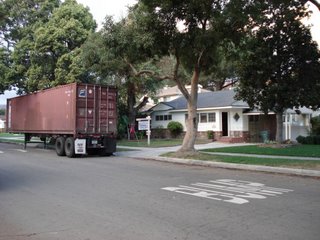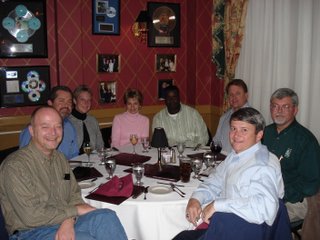Ted Haggard is on my mind this week. After the shock of his admission that he’d been leading a secret life, after the press had a field day with the news during the week of the elections, after seeing the reactions of my Christian and non-Christian friends… Mostly I’m sad for his family and his church and the National Association of Evangelicals (NAE), but I grieve some for him as well.
Some background: The NAE has been damaged by Haggard’s behavior, and that’s very sad to me. Among evangelical coalitions, the NAE are the good guys. Here's how they came about. In the early 1930s a man named J. Elwin Wright got frustrated that Christian groups spent so much time fighting each other that they didn’t get much Christian work done. He started an organization called the New England Fellowship, and virtually invented the movement known as cooperative evangelism, which allowed evangelical churches to work together based on their agreement on the big issues (who Christ is, the belief that the Bible is inspired by God, etc.), even if they disagreed on some of the small things (how churches are governed, details about the ‘end times’, etc.). This movement was successful with all but the crankiest of fundamentalists, and by 1942 it went nationwide in the form of the NAE. Wright said this at the first meeting of the NAE:
"We must speak out with courage against apostasy and apostate movements, but we must, at the same time, be wise and gracious enough to recognize that there are differences of doctrine among Bible-believing members of the Church of Jesus Christ upon which there is little hope that we will see eye to eye until the day when we no longer 'see through a glass darkly,' but face to face with our Lord."
The point is that this group was founded—and has continued—to be a faithful witness to the Christian message without being divisive or militant. In our present climate of vicious attacks both within the Christian movement and from those who watch us from outside, the NAE has been faithful to their original model of being faithful, courageous and humble in their interaction with the culture. This is the group, let’s not forget, that came out with a strong pro-environmental statement earlier this year because they recognized that care for the Earth was a central doctrine of our Christian faith.
The first president of the NAE, Harold John Ockenga (also the first president of Fuller Seminary), closed that first set of meetings with this comment:
"It is my earnest prayer that all of us will demonstrate ourselves beyond the age of adolescence and in the full stature of manhood, with all the mutual respect, tolerance, and graciousness which a mature man gives to another."
Now apart from the cultural sexism of the language he used, do you see the wisdom in what he said? Wouldn’t our Christian faith find more willing listeners if we treated the culture—and each other!—with mutual respect, tolerance and graciousness? Evangelical Christians have spent so much time fighting with each other and attacking the culture that we have forgotten that our primary task is to share the gospel of Jesus Christ with a world that needs so much to hear it.
But I digress…
Ted Haggard’s self-destruction has caught my eye and heart as I head back into pastoral ministry. The weight of expectations, the addictive drug of praise, the perception of wisdom and the granting of authority, all of these are minefields for those of us who step into church leadership. I don’t have to share Haggard’s specific problem to know that temptations are there, ready to trip any and all of us. Those temptations, and our unique sets of weaknesses in the face of them, are constant reminders of our need for God’s strength and protection, and also his grace when we fall.
In 2 Corinthians 12 Paul says this: “To keep me from becoming conceited . . .there was given me a thorn in my flesh.” After pleading with God to take away this weakness, God refuses and says to Paul: “My grace is sufficient , for my power is made perfect in weakness.” Now I’ve always liked the fact that Paul’s thorn is never named—it prevents any of us who don’t share it from dismissing the point of the story. And what is that point? For all believers, it teaches us that God does not demand perfection, only that we are willing vessels for his grace to be made known. But for pastors and other leaders there is a different point. We get credited more often than not with strengths we don’t really have. When that happens—when we believe the flattery—we run the risk of forgetting that God is the source of our wisdom and vision and ability, and that only in our weakness and impotence can we model and communicate Christ’s gospel in all its fullness. Ted Haggard may have forgotten that, and he may have done irreparable damage to his family, his church and the NAE because of it. But if God is to be believed, it is at this moment—in the despair and guilt and feelings of failure—that Haggard may experience and share the true meaning of Christ’s mercy and love and grace to the people around him. For the rest of us on this path of discipleship, it’s a reminder that God’s work in us is precisely that. It’s his work, not ours, no matter what our fans tell us.
Just 45 days before we leave.




